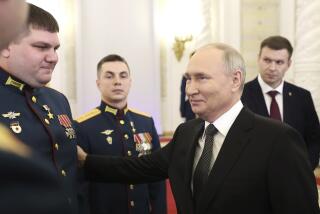Russian leader lengthens term
- Share via
MOSCOW — Russian President Dmitry Medvedev on Tuesday signed a law that stretches the presidential term from four years to six, amending his nation’s constitution for the first time.
The measure, enthusiastically backed by Prime Minister Vladimir Putin and his political protege, Medvedev, was hustled through both houses of parliament and the provincial legislatures in less than two months.
The amendment has sparked widespread speculation that Medvedev might step down early to allow Putin to return to the presidency.
Constitutional term limits forced Putin to give up the presidency this year despite the former KGB agent’s apparent taste for running the country and widespread popularity. Putin handpicked Med- vedev to run for president and moved to the prime minister’s office after the election.
The new law will not take effect during Medvedev’s current term.
Some observers insist that the argument over whether Putin or Medvedev occupies the presidential office misses the point altogether. Among Russians, Putin is widely assumed to have continued calling the shots without interruption, whatever his job title. The point, they argue, is to keep the same small clique spearheaded by Putin at the helm of the country for an extended stretch of time.
“This obviously reflects the striving of the ruling elite to get additional instruments and guarantees of preserving their empire,” said Andrei Ryabov, a scholar with the Carnegie Moscow Center. “They are looking to stay in power as long as possible, for their options to grow.”
Criticism came fast and harsh from Russia’s embattled opposition.
“We think the extension of the presidential term is a gateway to limitless extension of presidential power,” said Sergei Mitrokhin, leader of the Yabloko party. “This is the road to stagnation, to the further weakening of feedback between society and the authorities.”
The amendment is particularly worrisome to critics because the current power structure of Putin, Medvedev and their ruling party-dominated parliament seems unlikely to be overturned any time soon.
Since Putin was elected president in 2000, he has systematically weakened the opposition and exerted state control over mass media.
Amendments to the 1993 constitution are seen as being of benefit only to current rulers, as the appearance of a strong challenger is widely considered unlikely.
The changes come against a backdrop of growing uncertainty and looming instability in Russia. The global financial crisis has brought its oil-and-gas-boom to a dead halt, leaving many Russians struggling with layoffs and slashed salaries. A proposed tax hike on imported cars, meant to shore up a foundering domestic auto industry, has sparked protests across the country, some of which were violently squelched by riot police.
As economic turmoil spreads, many analysts are warning that the Kremlin will tighten its grip. Besides Tuesday’s measure, the government has launched a controversial push to expand the definition of treason. At the same time, Putin has backed legislation that would do away with jury trials for some offenses, including treason.
Human rights groups have criticized both measures, warning that the laws could criminalize anti-government critiques, further cripple foreign nongovernmental organizations and make it easier to imprison the Kremlin’s foes.
--
More to Read
Sign up for Essential California
The most important California stories and recommendations in your inbox every morning.
You may occasionally receive promotional content from the Los Angeles Times.










